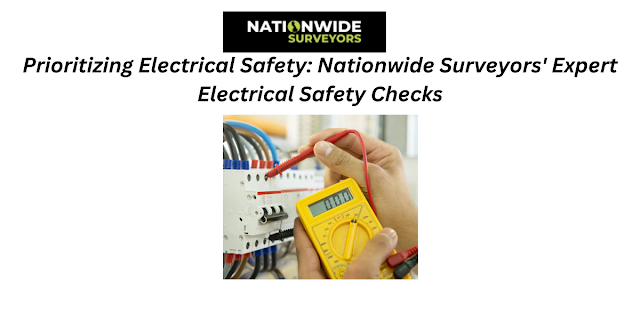How to Pass an EICR Inspection: Tips for Homeowners & Landlords
Ensuring your property meets electrical safety standards is crucial, and passing an EICR test (Electrical Installation Condition Report) is an essential part of this process. Whether you are a homeowner looking to sell or a landlord renting out a property, a successful EICR inspection can save you from costly repairs, legal complications, and potential hazards. Here at Nationwide Surveyors, we understand the importance of electrical compliance and have compiled a list of expert tips to help you pass your EICR test with ease.
Understanding the EICR Test
An EICR test assesses the safety and overall
condition of your property's electrical installations. Carried out by a
qualified electrician, the inspection identifies any potential risks such as
faulty wiring, overloaded circuits, or outdated electrical components. The goal
is to ensure that your electrical systems comply with the latest safety
regulations and do not pose a danger to occupants.
Top Tips to Pass Your EICR
Inspection
1. Conduct a Preliminary Visual
Inspection
Before booking your EICR test, perform a visual
check of your electrical system. Look for obvious signs of wear and tear such
as damaged sockets, exposed wiring, or flickering lights. If you notice any
issues, address them immediately to improve your chances of passing the
inspection.
2. Ensure Your Consumer Unit is
Up to Standard
The consumer unit (or fuse box) is a crucial part
of your electrical system. Modern consumer units with Residual Current Devices
(RCDs) offer enhanced safety features and are more likely to meet EICR
standards. If your fuse box is outdated, consider upgrading it before the
inspection.
3. Check for Overloaded Circuits
Overloading electrical circuits can lead to
overheating and increase the risk of fire. Ensure that power outlets are not
overloaded with multiple high-power appliances. If necessary, install
additional circuits to distribute the electrical load more evenly.
4. Inspect and Test Your
Electrical Fixtures
Sockets, switches, and light fittings should be in
good working order and securely fitted. Any loose connections or discolored
fixtures should be replaced before the EICR inspection.
5. Ensure Proper Earthing and
Bonding
Proper earthing and bonding are critical for
electrical safety. If your property’s earthing system is outdated or
non-compliant, it may result in a failed EICR test. A qualified electrician can
check and upgrade the earthing system if required.
6. Address Any Previous
Electrical Faults
If your property has had past electrical issues,
ensure that they have been properly repaired. Keep records of any electrical
work carried out, as this can be helpful during the inspection.
7. Hire a Qualified and
Experienced Electrician
To ensure a smooth and thorough EICR test, hire a
professional with experience in electrical inspections. Nationwide Surveyors
has a team of certified experts who can help identify and rectify any potential
issues before your official EICR test.
What Happens If You Fail the EICR
Test?
If your property does not pass the EICR test, the
electrician will provide a report outlining the necessary remedial work.
Depending on the severity of the issues, you may be required to carry out
immediate repairs to meet compliance standards. Nationwide Surveyors can assist
in coordinating any necessary fixes to ensure your property meets the required
electrical safety regulations.
Conclusion
Preparing for an EICR test doesn’t have to be
stressful. By following these essential tips, you can improve your chances of
passing the inspection and maintaining a safe living environment. Nationwide Surveyors is here
to support you through the process, ensuring your property remains compliant
with all electrical safety standards. Contact us today to schedule your EICR
test and secure peace of mind for yourself and your tenants.




Comments
Post a Comment